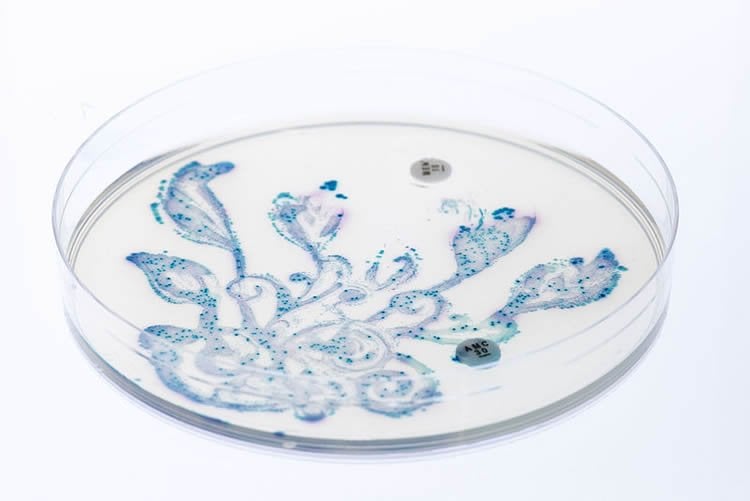Specific combinations of gut bacteria produce substances that affect myelin content and cause social avoidance behaviors in mice, according to a study conducted at the Icahn School of Medicine at Mount Sinai and published today in the medical journal eLife. This research suggests that targeting intestinal bacteria, or their metabolites, could be one way to treat debilitating psychiatric disorders and demyelinating diseases, like multiple sclerosis.
Multiple sclerosis is an autoimmune disorder characterized by damage to myelin, the insulating sheath around the axons of nerve cells that allows for faster electrical impulse conduction. Myelination is critical for everyday brain function. Damaged myelin results in altered synaptic transmission and clinical symptoms. Previous research from the Center of Excellence for Myelin Repair at The Friedman Brain Institute at the Icahn School of Medicine reported a thinning of myelin and a reduction of myelinated fibers in preclinical models of depression, thereby providing a biological insight for the high rate of depression in MS patients.
This current study led by Patrizia Casaccia, MD, PhD, Professor of Neuroscience, Genetics and Genomics, and Neurology, and Chief of the Center of Excellence for Myelin Repair, and post-doctoral fellow Mar Gacias, PhD, identifies bacteria-derived gut metabolites that can affect myelin content in the brains of mice and induce depression-like symptoms.
Researchers transferred fecal bacteria from the gut of depressed mice to genetically distinct mice exhibiting non-depressed behavior. The study showed that the transfer of microbiota was sufficient to induce social withdrawal behaviors and change the expression of myelin genes and myelin content in the brains of the recipient mice.
“Our findings will help in the understanding of microbiota in modulating multiple sclerosis,” says Dr. Casaccia. “The study provides a proof of principle that gut metabolites have the ability to affect myelin content irrespective of the genetic makeup of mice. We are hopeful these metabolites can be targeted for potential future therapies.”

In an effort to define the mechanism of gut-brain communication, researchers identified bacterial communities associated with increased levels of cresol, a substance that has the ability to pass the blood-brain barrier. When the precursors of myelin-forming cells were cultured in a dish and exposed to cresol, they lost their ability to form myelin, thereby suggesting that a gut-derived metabolite impacted myelin formation in the brain.
Further study is needed to translate these findings to humans and to identify bacterial populations with the potential to boost myelin production.
Funding: Virginia Commonwealth University and BERG Health contributed to this study.
The National Institutes of Health (Award# R37NS042925) provided funding. This research does not represent the official views of the NIH.
Source: Matt Kozar – Mount Sinai Hospital
Image Credit: The image is credited to Nicola Fawcett and is licensed CC BY-SA 4.0.
Original Research: Abstract for “Microbiota-driven transcriptional changes in prefrontal cortex override genetic differences in social behavior” by Mar Gacias, Sevasti Gaspari, Patricia Mae-Santos, Sabrina Tamburini, Monica Andrade, Fan Zang, Nan Shen, Vladimir Tolstikov, Michael A Kiebish, Jeffrey L Dupree, Venetia Zachariou, Jose C Clemente, and Patrizia Casaccia in eLife. Published online March 14 2016 doi:10.7554/eLife.13442
Abstract
Microbiota-driven transcriptional changes in prefrontal cortex override genetic differences in social behavior
Gene-environment interactions impact the development of neuropsychiatric disorders, but the relative contributions are unclear. Here, we identify gut microbiota as sufficient to induce depressive-like behaviors in genetically distinct mouse strains. Daily gavage of saline in non-obese diabetic (NOD) mice induced a social avoidance behavior that was not observed in C57BL/6 mice. This was not observed in NOD animals with depleted microbiota via oral administration of antibiotics. Transfer of intestinal microbiota, including members of the Clostridiales, Lachnospiraceae and Ruminococcaceae, from vehicle-gavaged NOD donors to microbiota-depleted C57BL/6 recipients was sufficient to induce social avoidance and change gene expression and myelination in the prefrontal cortex. Metabolomic analysis identified increased cresol levels in these mice, and exposure of cultured oligodendrocytes to this metabolite prevented myelin gene expression and differentiation. Our results thus demonstrate that the gut microbiota modifies the synthesis of key metabolites affecting gene expression in the prefrontal cortex, thereby modulating social behavior.
“Microbiota-driven transcriptional changes in prefrontal cortex override genetic differences in social behavior” by Mar Gacias, Sevasti Gaspari, Patricia Mae-Santos, Sabrina Tamburini, Monica Andrade, Fan Zang, Nan Shen, Vladimir Tolstikov, Michael A Kiebish, Jeffrey L Dupree, Venetia Zachariou, Jose C Clemente, and Patrizia Casaccia in eLife. Published online March 14 2016 doi:10.7554/eLife.13442






